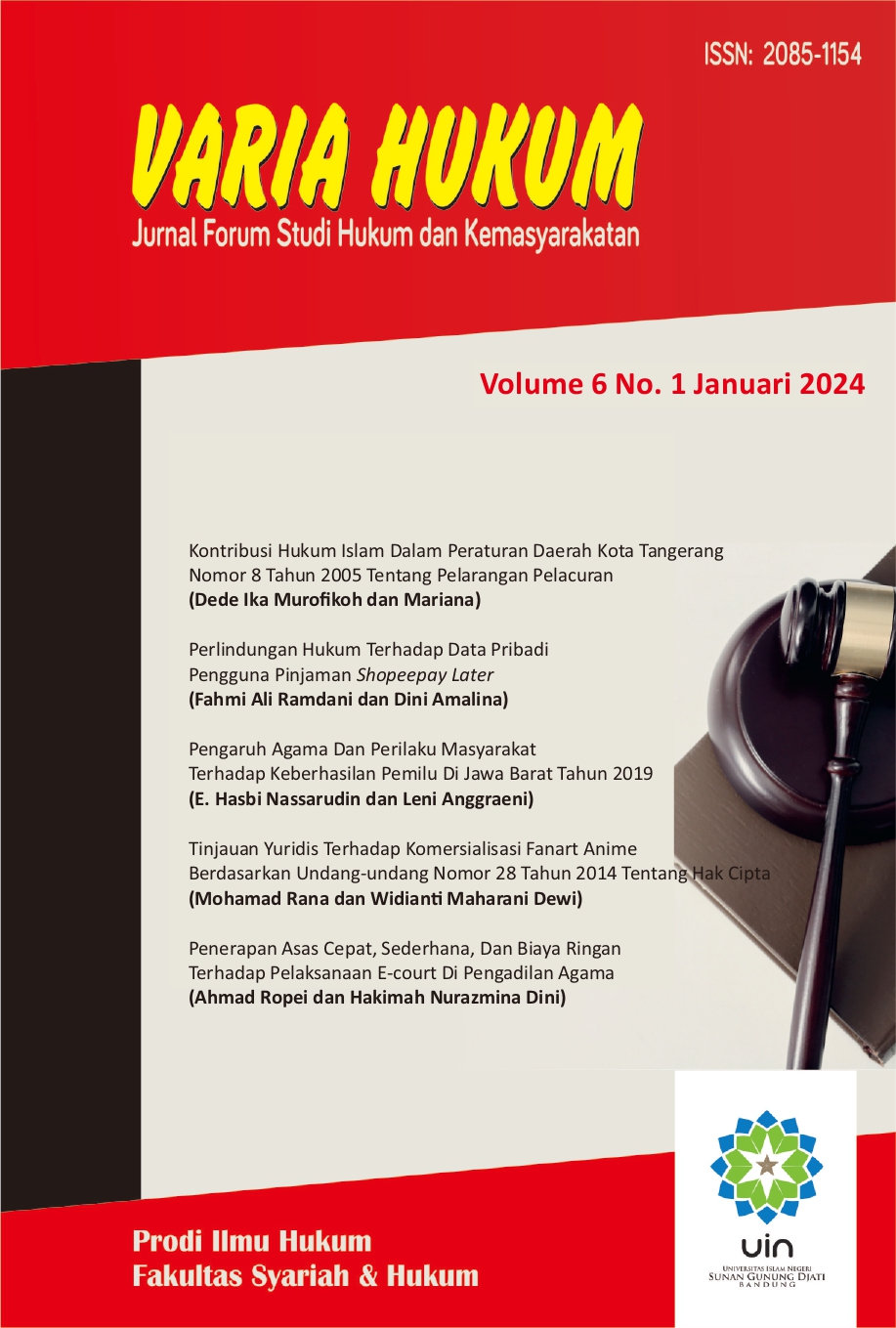TINJAUAN YURIDIS TERHADAP KOMERSIALISASI FANART ANIME BERDASARKAN UNDANG-UNDANG NOMOR 28 TAHUN 2014 TENTANG HAK CIPTA
DOI:
https://doi.org/10.15575/vh.v6i1.26784Keywords:
Commercialization, Fanart, Merchandise, Anime, Copyright LawAbstract
The commercialization of unofficial anime fanart is becoming more visible these days. This may have an impact on the anime business, including production house losses. The author plans to explore deeper into the relationship between anime fanart and intellectual property rights, as well as the relationship between copyright law and the legality of commercializing anime fanart in the form of unapproved items, on this occasion. The author employs a hit-or-miss approach to normative legal research approaches. According to research, Copyright Law Number 28 of 2014 governs this action.
Komersialisasi unofficial fanart anime kian mencuat ke permukaan. Hal tersebut dapat berpengaruh kepada industri Anime termasuk kerugian pada rumah produksi. Dalam kesempatan ini, penulis bermaksud untuk mendalami lebih dalam hubungan antara fanart anime dengan hak kekayaan intelektual serta hubungan antara hukum hak cipta dan legalitas komersialisasi fanart anime dalam bentuk unofficial merchandise. Penulis menggunakan metode penelitian hukum normative dengan pendekatan perundang-undangan. Hasil penelitian menunjukkan bahwa ketentuan Undang-Undang Nomor 28 Tahun 2014 tentang Hak Cipta telah memberikan pengaturan mengenai tindakan komersialisasi unofficial fanart anime.
References
A, Ishida. “Copyright Infringement in Japan’s ‘Otaku’ Marketplace: A Study of Fanart Commodity and ‘Doujinshi’ Culture.†Electronic Journal of Contemporary Japanese Studies 15, no. 1 (2015). https://www.japanesestudies.org.uk/ejcjs/vol15/iss1/3/.
A, Ishida, and Sano K. “The Cultural Economy of Fan Art in Anime Fandoms: Creating and Consuming Fan Art in Online Fan Communities.†International Journal of Cultural Studies 21, no. 6 (2018): 573–90.
Benuf, Kornelius, and Muhammad Azhar. “Metodologi Penelitian Hukum Sebagai Instrumen Mengurai Permasalahan Hukum Kontemporer.†Jurnal Gema Keadilan Volume 7 E (n.d.).
Halimi, Sisila A. “Anime Fanart in Indonesia: A Visual Representation of Young People’s Imagination and Creativity.†Journal of Visual Art and Design 12, no. 1 (2018).
Japan. Copyright Law of Japan, Pub. L. No. 48 (1970).
K, Hellekson, and Busse K. Introduction: Work, Fan, Play, Labor. In Fan Fiction and Fan Communities in the Age of the Internet: New Essays. McFarland & Company, Inc., Publishers, 2006.
M, Emily. “Fanart as a Form of Participatory Culture: Implications for Art Education.†Visual Arts Research, 2014.
Maulana, Rifki Indra. “Pelanggaran Hukum Dalam Industri Animasi Jepang (Studi Kasus: Fansubbing).†11 Desember, 2018. http://lipi.go.id/publikasi/pelanggaran-hukum-dalam-industri-animasi-jepang-studi-kasus-fansubbing/26169.
N., Arief M, and Prasitiwi I. “Legal Aspect of Copyright Infringement on Anime Fansub in Indonesia.†KnE Social Sciences 3, no. 12 (2018): 57–63. https://doi.org/https://doi.org/10.18502/kss.v3i12.3386.
Siregar, R. “Pelanggaran Hak Cipta Pada Anime Dan Manga Di Indonesia (Studi Kasus Di Kalangan Komunitas Manga Dan Anime Di Bandung).†Jurnal Yuridika 1, no. 34 (2019): 76–91. https://doi.org/http://dx.doi.org/10.20473/ydk.v34i1.12936.
Suhaimi. “PROBLEM HUKUM DAN PENDEKATAN DALAM PENELITIAN HUKUM NORMATIF.†Jurnal YUSTITIA Vol. 19 No (n.d.).
Downloads
Published
How to Cite
Issue
Section
Citation Check
License
Authors who publish in Varia Hukum agree to the following terms:
- Authors retain copyright and grant the journal right of first publication with the work simultaneously licensed under a Attribution-ShareAlike 4.0 International (CC BY-SA 4.0) License that allows others to share the work with an acknowledgement of the work's authorship and initial publication in this journal.
- Authors are able to enter into separate, additional contractual arrangements for the non-exclusive distribution of the journal's published version of the work (e.g., post it to an institutional repository or publish it in a book), with an acknowledgement of its initial publication in this journal.
- Authors are permitted and encouraged to post their work online (e.g., in institutional repositories or on their website) prior to and during the submission process, as it can lead to productive exchanges, as well as earlier and greater citation of published work (See The Effect of Open Access).





